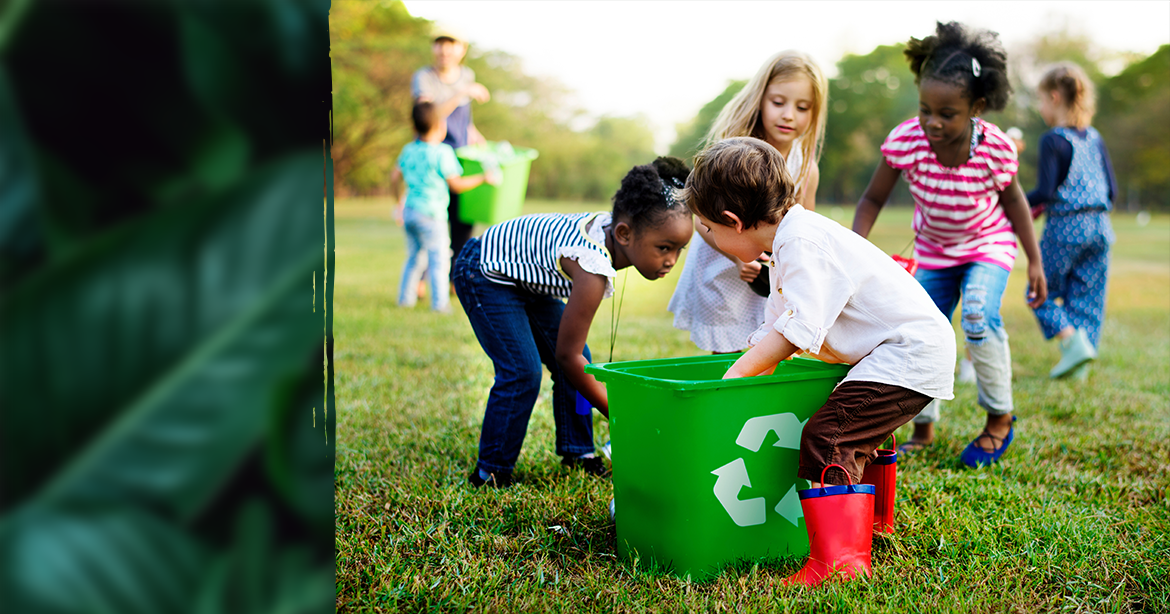Practical Sustainability Tips from MUSE Global School

At MUSE Global School, we take our commitment to the environment so seriously that it’s one of the Five Pillars that form the foundation of our educational philosophy. We believe that we must turn our students into better citizens of the world and give them the tools and knowledge they need to take care of our wild, living earth. And that commitment to a greener world extends well beyond our classrooms!
In this guide, we’ll go over some simple and effective ways to create sustainability in your life and in your home. So roll up your sleeves because it’s time to get green!
Elevate Your Energy Efficiency with These Green Upgrades
Our first step towards sustainability and a greener home is improving your energy efficiency. This step might cost a little more initially, but it can save you a lot of money in the long run.
First, we recommend changing from incandescent bulbs to LED. According to the U.S. Department of Energy, that change alone can save you up to $225 per year on your power bills. Plus, there’s no need to go out and buy new bulbs every few months because LEDs last up to 25 times longer than incandescent bulbs. And since they use almost 75% less energy than regular bulbs, you’re also lowering your carbon footprint!
Next, just unplug your devices! According to the Natural Resources Defense Council, the average cost for always-on electronics in the United States is $19B and causes over 44 million metric tons of carbon. You can fight this by investing in power strips that make it easier to plug and unplug several electronics at once or smart power strips that limit the amount of power electronics get when not in use.
Finally, check out how you could incorporate renewable energy in your home. Your local power company may have rebates to help you purchase or install the equipment you need to add renewable energy to your home. Some power companies may also have the option to get some or all of your energy needs from their renewable sources. Installing solar panels, miniature wind turbines, or geothermal/solar water heating can be pricey, so be sure to check out all of your options.
At MUSE Global School, we’ve offset our power needs with 5 solar sunflowers that can reduce our power usage by up to 90%!
The Triple R’s of Environmental Stewardship: Reduce, Reuse, Recycle
According to data from the Environmental Protection Agency (EPA), the recycling and composting of municipal solid waste (or your weekly trash pick-up) saved over 193 million metric tons of carbon dioxide equivalent in 2018. Recycling programs also lessen the environmental impact of our trash by limiting the amount of refuse stored at landfills or incinerated.
Recycling also saves energy! According to that same data, the energy you save by recycling ten plastic bottles can power a laptop for over 25 hours. Couple all of that with the fact that the recycling programs in the United States account for nearly 700,000 jobs every year, and you’ll see just how important recycling is for our planet AND our community! That’s why MUSE has a robust recycling program.
You can check with your local waste management office to get your own recycling bin, usually for free. You’ll need to do some extra research to see what items you can and can’t recycle in your area, but this helpful page from the EPA should help you get started.
Cultivate Your Eco-Consciousness By Growing Your Own Greens
What’s greener than a green thumb? Commercial fruits and vegetables are often shipped across the country to reach your plate and rack up a sizable carbon footprint. Why put that undue stress on the environment when you could just grow them like we do in our 100+ raised garden beds?
Growing your own food also allows you to control what you put in your body. Use (or don’t use) whatever fertilizer or pesticides you want to keep your plants happy and healthy.
You can also flex your recycling skills by composting at home. Composting is a controlled process that converts organic material (food waste) into a nutrient-rich addition to your soil. It’s another way to limit the amount of trash going into your local landfill and help your garden reach the next level.
For some tips on how to start your own compost, check out this handy site from the EPA. If you’re interested in learning how to start a garden, be on the lookout for free workshops like Start Your Spring/Winter Garden hosted by our MUSE Global School faculty!
Water-Saving Strategies for Everyday Use
Did you know that only .4% of all the water on Earth is freshwater? It’s true! Did you ALSO know that the average person wastes about 30 GALLONS of water daily? Yikes!
There are plenty of ways to make your water usage more efficient. Just by making the switch to five-minute-long showers, you can save nearly 10 gallons of water every day. Turning off the faucet when you’re lathering your hands, brushing your teeth, or shaving can save even more water, and installing low-flow aerators in those same faucets can cut your water usage in half! Repairing leaky pipes can also help you save water: A pipe that leaks one drop per second will waste about 19 liters of water per day.
You can save water outside of your house, too. By periodically aerating your lawn, you’ll make it easier for the soil to absorb rainwater and reduce watering. Watering your plants when it’s cooler outside keeps water from evaporating and helps you get more bang for your buck. And installing a rain barrel lets you collect that precious liquid to use in the garden you’re growing now! Our own campus garden features a water-efficient drip system to minimize water use.
Want more tips for being more efficient with your water? Just check out this helpful document from the Washington State Department of Health.
Conclusion: MUSE Global School’s Vision for a Sustainable Future
You see the words “green” and “sustainability” used frequently as buzzwords. At MUSE Global School, however, sustainability is a huge part of who we are as an institution. By embracing this movement for a greener world, we’re not just making a better environment for ourselves, we’re shaping a better future for our students and other children across the globe.
As we help to weave these practices into our students’ lives, and as you embark on your journey for a greener home, remember what you’re doing this for. We only have one Earth, and it needs to be protected. As the Canadian philosopher Marshall McLuhan said, “There are no passengers on spaceship earth. We are all crew.”
Want to learn more about how MUSE Global School brings sustainability to education? Visit our website now to discover how MUSE is transforming education, one step at a time. Uncover the magic when sustainability meets education, and join us in preparing young minds for a brighter, greener tomorrow. Click HERE to learn more!

